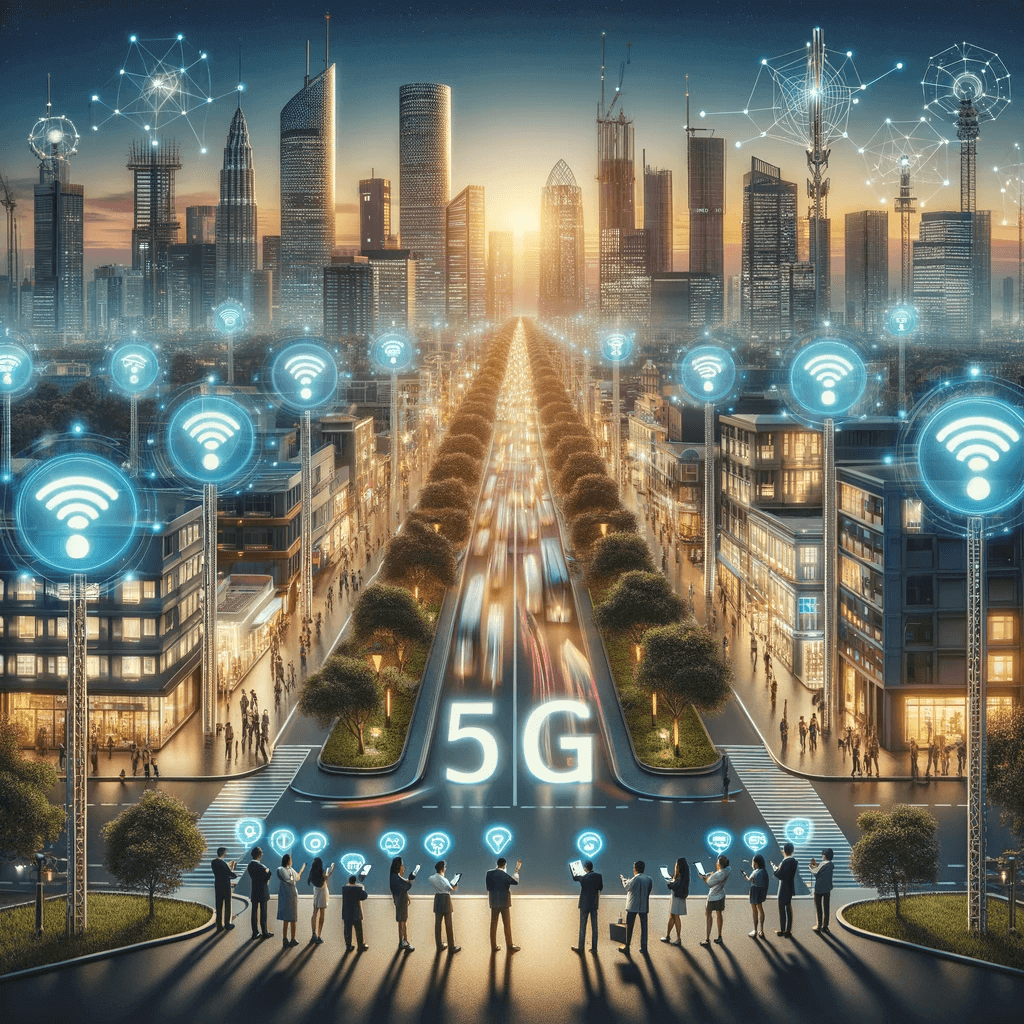
It enables advanced technologies, from IoT to AI and beyond. However, this transformative journey comes with challenges that businesses must navigate to fully harness 5G’s potential. Even so, they stand to benefit greatly from its myriad opportunities.
Challenge:
Upgrading to 5G requires a significant overhaul of existing telecommunications infrastructure. Businesses and governments need to invest in new cell towers and fiber-optic cabling. They also must invest in sophisticated network equipment. These investments are essential to accommodate 5G’s high frequencies and massive data volumes.
Impact:
The cost of these upgrades is significant, especially challenging for developing regions.. Without fair investment in 5G infrastructure, there’s a risk of widening the digital divide. This could lead to less wealthy areas getting slower, less reliable internet, which might slow down economic growth all over the world.
Challenge:
5G’s wide network connects more devices than ever, leading to new security risks. With so many devices linked, there’s a bigger chance for cyber threats such as data breaches and hacking.
Impact:
To mitigate these risks, businesses must implement state-of-the-art cybersecurity strategies. This requires securing the network and protecting the many connected devices against breaches. Such a task demands continuous vigilance and investment.
Challenge:
5G operates across a wide range of frequencies, from low bands with broad coverage to high bands for ultra-fast speeds. However, high bands cover shorter distances. Managing this spectrum well is tough because these resources are limited. It’s both a logistical and technical problem.
Impact:
Incorrect or inefficient spectrum allocation can cause congestion. This happens when too many signals compete for bandwidth. This results in slower speeds and less reliable connections. This would compromise the benefits 5G promises, requiring careful planning. International cooperation is needed to optimize spectrum use.
Challenge:
The global nature of 5G technology meets different regulatory landscapes in each country. This creates a complex situation for its deployment. Creating a cohesive framework for rapid tech advances while ensuring safety, privacy, and fairness is tough for regulators. This task is challenging due to the fast pace of technological change.
Impact:
Delays in setting up clear, unified regulations can hinder innovation. This can also slow the rollout of 5G networks and services. This impacts not just the telecom industry but also affects a wide range of businesses. Those relying on 5G to introduce new services and enter new markets are especially hampered.
The leap in speed and reduction in latency offered by 5G is nothing short of revolutionary. This high-performance connectivity enables real-time data transfer and processing. It’s vital for applications needing quick responses, like autonomous vehicles, real-time surveillance, and instant financial transactions.
5G’s capacity to support a vast number of devices simultaneously is a game-changer for the IoT. This allows for the deployment of smart sensors and devices on an unprecedented scale, enabling smarter cities, industries, and homes. The data collected can drive efficiencies, reduce costs, and enhance decision-making through analytics and AI.
The capabilities of 5G open up a realm of possibilities for new services and applications that were previously unfeasible. For instance, augmented reality (AR) and virtual reality (VR) offer immersive training and marketing experiences. These technologies work smoothly without latency issues. Advancements in telemedicine mean better healthcare can be provided remotely, reaching more people.
As 5G networks spread, businesses can use this connectivity to grow their operations. This allows them to reach customers around the world. Better communication and data transfer make working together across countries easier. They help manage global supply chains in real-time and serve customers worldwide, making business fair for all sizes.
The arrival of 5G technology brings both challenges and opportunities for businesses everywhere. This creates a complex landscape for them to navigate. Navigating hurdles like infrastructure investment, security, spectrum allocation, and regulatory compliance needs careful strategy. Yet, the rewards could transform industries. Better connections, more IoT devices, new services, and worldwide market access are only the start. As businesses adapt and overcome these challenges, they unlock the full potential of the 5G era. This drives innovation, efficiency, and growth in a world that’s more connected every day.
we are the best company giving services of UI UX designing, web developing or SEO since 2001.